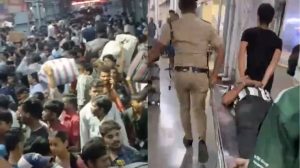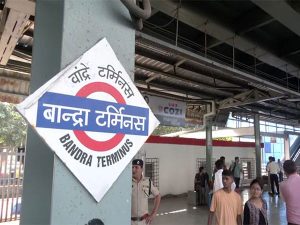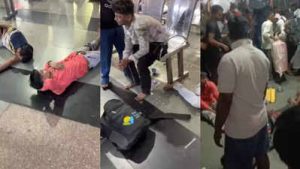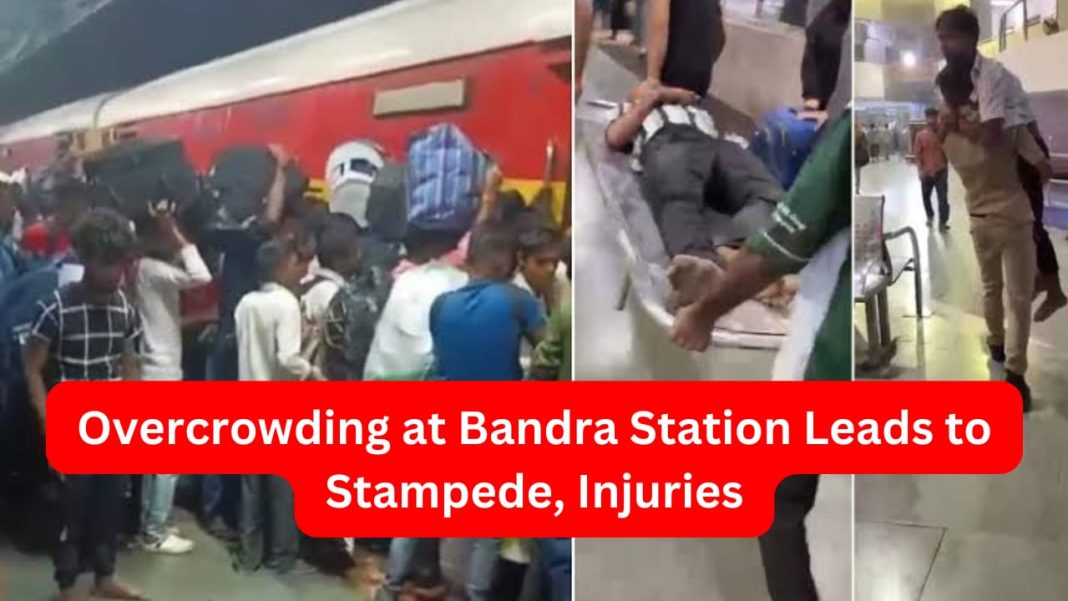Digital News Guru:
In a tragic event on October 27, 2024, a stampede broke out at Bandra Terminus in Mumbai, leaving nine people injured as holiday travelers scrambled to board the Gorakhpur Antyodaya Express. The stampede is a stark reminder of the challenges faced by India’s rail networks, particularly during peak travel seasons such as Diwali and Chhath Puja, when the influx of travelers overwhelms the infrastructure. This incident has prompted an urgent response from the authorities, highlighting the importance of crowd management and infrastructure improvement to prevent such tragedies.
Details of the Incident
The stampede occurred around 2:45 am as the Gorakhpur Antyodaya Express arrived at platform one. Reports indicate that passengers, many traveling to Uttar Pradesh for holiday celebrations, crowded the unreserved compartments, resulting in a chaotic rush to secure seats. Social media footage captured scenes of panic as passengers were pushed and shoved, leading to several individuals being trampled. Railways officials reported that nine people sustained injuries and were provided immediate medical assistance. Thankfully, no fatalities have been reported, but the situation underscores the need for improved safety measures during high-demand travel periods.

Festive Rush Overwhelms Rail Services
India’s rail system is one of the busiest in the world, catering to millions of passengers each day. However, the festival season intensifies the demand, as people from across the country travel to their hometowns to celebrate Diwali and Chhath Puja with their families. Traditionally, the weeks leading up to these festivals witness a surge in train reservations, especially in the northern and western regions. This influx of travelers places immense strain on stations and train services, which often struggle to accommodate the volume. Many passengers, particularly those without confirmed reservations, rely on unreserved compartments, which are typically overcrowded.
In light of this surge, Central and Western Railways are taking several precautionary measures to prevent overcrowding, such as introducing additional train services to key destinations. The authorities have also imposed temporary restrictions on the sale of platform tickets at major stations, including Chhatrapati Shivaji Maharaj Terminus, Dadar, Kurla Lokmanya Tilak Terminus, and Thane, to control the flow of passengers on platforms and reduce congestion. The platform ticket restrictions will remain in effect until November 8, coinciding with the end of the festive travel rush.

Immediate Measures Taken by Railway Authorities
Following the Bandra stampede, the railways have implemented additional crowd control strategies, which include stationing extra personnel at high-traffic stations and enhancing surveillance to monitor passenger flow. The restriction on platform ticket sales, aimed at limiting the number of non-traveling visitors at stations, is one of the key measures implemented to manage the festive rush. This restriction affects multiple stations across Mumbai, including Dadar, Bandra, and Vasai Road, and is expected to help ease congestion by reducing the number of people accessing the platforms.
In addition, the authorities have announced the operation of two unreserved special trains between Mumbai and Gorakhpur to accommodate passengers traveling for Diwali and Chhath Puja. These additional services will alleviate some pressure from regular trains and provide more options for passengers, especially those unable to secure reserved seats.
Railway officials are also exploring ways to enhance passenger awareness regarding safe travel practices, encouraging people to avoid overcrowded compartments and wait for alternative services if possible. Public announcements and signage at stations remind travelers of safety protocols and discourage rushing towards trains.

Addressing Broader Challenges in Railway Infrastructure
The Bandra stampede incident has reignited discussions on India’s railway infrastructure and the pressing need for modernization to accommodate growing passenger demand. With over 8 billion annual passengers, the Indian Railways faces significant logistical challenges, particularly during peak seasons. Experts argue that while additional train services are helpful, the rail network requires long-term investments in infrastructure to meet the needs of a rapidly increasing population.
One key recommendation is the expansion of train frequencies on high-demand routes, along with the introduction of more unreserved coaches to reduce overcrowding. Further, updating platform layouts to allow for more efficient boarding and alighting could help prevent bottlenecks, especially at busy stations. The integration of digital solutions, such as mobile apps to track platform congestion levels, is another potential measure to improve crowd management.
Safety advocates emphasize the need for automated crowd control systems, similar to those used in metro stations, where electronic barriers help regulate entry and exit. Implementing such systems at major railway stations could mitigate risks by controlling passenger flow and ensuring that platforms are not overwhelmed.
Public Response and Growing Concerns
The Bandra incident has sparked concerns among the public about safety during travel, especially for those journeying home during the holiday season. Many travelers have expressed apprehension over crowding issues, pointing out that safety measures are inconsistently enforced across stations. Social media platforms have been flooded with appeals for stricter regulation and better planning to ensure a safer travel experience.
Some passengers who witnessed the stampede recounted feeling helpless in the crowded environment, with one individual stating that the experience was “terrifying” and that crowd management seemed “nonexistent.” Such accounts highlight the urgent need for authorities to implement consistent crowd control measures across all high-traffic stations.
The Role of Public Awareness in Preventing Stampedes
While infrastructure improvements are essential, public awareness also plays a crucial role in preventing stampedes. Authorities are encouraging travelers to avoid peak travel times when possible and to make use of advance booking options to secure confirmed seats, thereby reducing reliance on overcrowded unreserved compartments. Rail officials are also advising passengers to be mindful of their surroundings and avoid rushing onto platforms or trains in crowded conditions.

Educational campaigns on safe travel practices during festival seasons, including avoiding overcrowded platforms and waiting for alternative trains, can help mitigate risks. Railways are also collaborating with local authorities to provide real-time updates on train schedules and platform congestion, helping passengers make informed travel decisions.
Looking Forward: Enhancing Railway Safety and Efficiency
The Bandra stampede incident serves as a crucial reminder of the urgent need to address the challenges within India’s railway infrastructure. As the country continues to experience population growth and increasing mobility demands, investment in railway modernization and expansion is more critical than ever. Enhanced safety protocols, coupled with infrastructure improvements, can prevent future tragedies and ensure a safer, more efficient rail network.
The Indian Railways’ response to this incident, including the introduction of additional train services and restrictions on platform ticket sales, reflects a proactive approach to handling the festival rush. However, a long-term solution requires sustained efforts and investments that align with the evolving needs of passengers.
Moving forward, a combination of infrastructure upgrades, technological innovation, and public awareness initiatives will be vital to achieving a safer and more reliable railway system. By addressing these needs, India’s railways can provide a more secure travel experience for millions of passengers, especially during high-demand seasons. The lessons learned from the Bandra stampede will hopefully lead to meaningful changes that prioritize passenger safety and prevent similar incidents in the future.
You May Also Read: ISRO’s Bold Future: Gaganyaan Human Spaceflight by 2026 and Chandrayaan-4 for 2028








